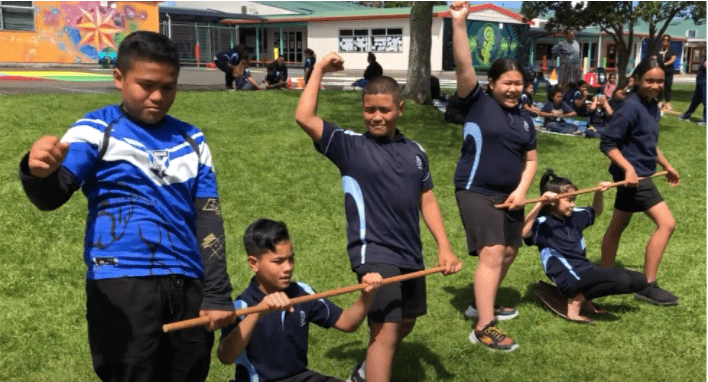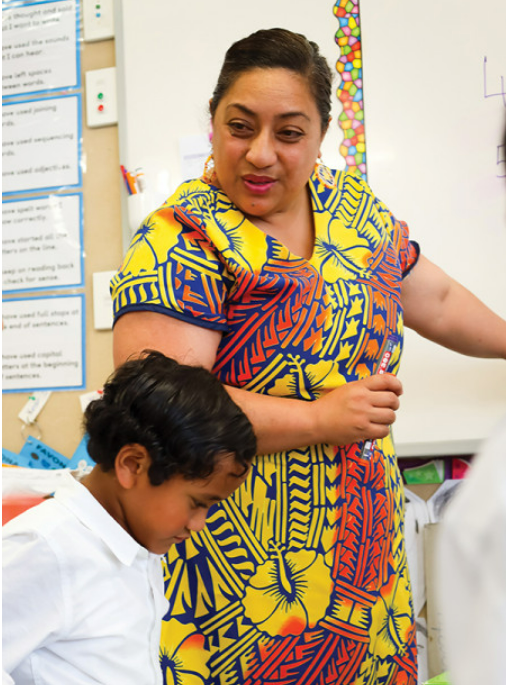
From a very young age, Favona Road Primary School teacher Joylyn Ikiua was exposed to cultural values and traditions that have made her proud of her Niuean heritage and culture.
Born and raised in Niue (affectionately known as The Rock of Polynesia being one of the largest coral atolls in the world), she has strong memories of her upbringing which included playing cultural or traditional sports.
“Sport has been a significant part of my upbringing. From primary school to high school in Niue, we regularly played cultural games and village sports (Toho Toume and Niu Fola) as well as others like volleyball, touch rugby and even tabloid sports which are common here in New Zealand,” she says.
“In New Zealand, we’ve noticed that our kids love playing traditional games like Toho Toume as it’s an avenue to learning about culture. It helps to strengthen their identity which is important to helping young people make that connection from here in New Zealand to Niue.”
Joylyn Ikiua is a community champion of Vagahau Niue (Niue language), in fact all things from ‘The Rock’, which she excitedly talks about on the Village Games Talanoa Series with Healthy Families South Auckland’s Pita Alatini (Lead Systems Innovator) – watch it here.
In her 17th year of teaching in New Zealand this year, she started her career at Southern Cross School before moving to Favona Road Primary School where she was part of the inaugural staff in the school’s Niue Bilingual unit in 2021.

With her vast teaching experience, Joylyn who proudly hails from the Niue village of Liku, recognises the uniqueness of showcasing cultural sports like Toho Tohume (Niue land skiing) and Niu Fola (coconut bowls) in a modern New Zealand environment and its importance to helping revitalise Vagahau Niue.
“Toho means “pull” and toume is the part of the coconut tree which protects the coconut flowers.
“People must choose the correct toume, the layers that fall on the ground are the ones to use”. The shape of the toume should be curbed so that it can hold a person’s foot,” she says.
The objective of Toho Toume is to get to the finish line first while a ‘rider or skier’ holds on to a stick. Two runners pull the skier who is holding the stick while on a toume.
“In New Zealand, Niue cultural games will likely be played in the Early Childhood Centres and in primary schools (like Favona) we play To’o Toume and Ola Fiu Niu,” says Joylyn.
“Although the sport is well-known to many back home in Niue, it’s not popular in New Zealand. The main problem is the availability of resources like toume here and trying to bring it from the islands. On the other hand, if we can use recycled materials to form the shape of toume it could help our people play it with family and friends throughout the year.”
Pita Alatini, Lead Systems Innovator, says the Village Games Talanoa Series is an online talanoa (discussion) platform to connect with community champions such as Joylyn.
“The idea is to educate audiences about the unique features of traditional games and sports and how they compel Pacific people to move and achieve good health and wellbeing. Traditional games like Toho Toume are fun, and connect to the culture and language of Niueans in New Zealand and across Niue,” he says.
“That’s the beauty and the uniqueness of our Village Games movement. We have seen and heard from community champions and local people how culture, language and movement combine to enjoy living well.
The Village Games Talanoa series is delivered by Healthy Families South Auckland (The Cause Collective) by Pita Alatini (Lead Systems Innovator) and Fila Fuamatu who interviewed community champions.